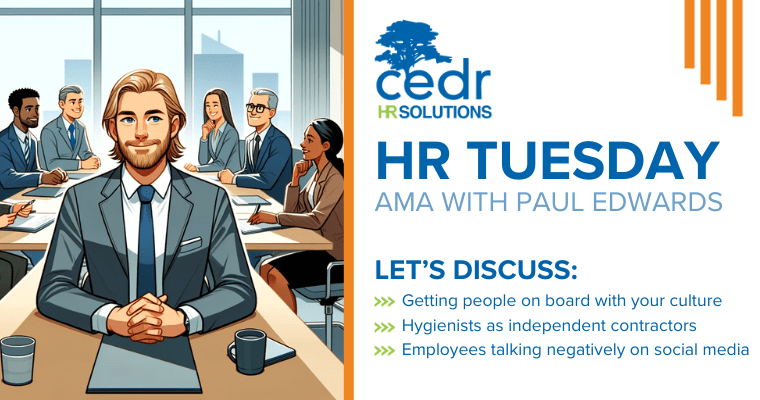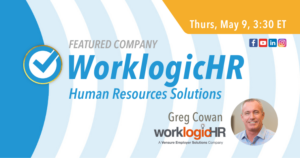Let’s Set Some Digital Boundaries – Employee Social Media Policies – HR Tuesday AMA with CEDR (February 2024)
Hello AADOM Tribe! Welcome back to the monthly LIVE Ask Me Anything with Paul Edwards, CEDR CEO & Founder, and Heather Colicchio, founder and president of AADOM. Anytime you feel like a little extra perspective, or help might be nice throughout the year, keep sending your toughest HR questions to Paul and CEDR’s team of HR professionals. Our team will pick from the submitted dozens and do our absolute best to give some effective and creative ideas for solving your issue. To submit your questions, click here…Click to open link in a new tab…!
Thanks for all the questions you’ve been submitting and those coming in 2024! Once a month, Paul and CEDR’s team of experts weigh in and answer three of your HR questions for HR Tuesday’s article and live webcast.
For the in-depth, expanded, and detailed answers…
Listen to HR Tuesdays live, mark your calendar for the second Tuesday of each month, or go here to check out the archived recordings.
All of your daily human resource issues likely have some state, federal, or local employment laws that you must comply with while, at the same time, trying to find the best human way to solve the core problem. We will fit the two together during our answers and help you devise some great resolutions.
HR Tuesday needs your questions, so please send us your toughest ones! Our team will pick from the dozens of great questions you all submit and do our absolute best to give some effective and creative ideas for solving your issue. To submit your questions, click here!
Let’s get started…
This Month, We Take a Deep Dive Into Your Employee Social Media Policies Questions
Picture this: It’s a typical Monday morning; you are at the office early (as always) to prepare for the day and are sipping your coffee, taking a break to scroll through your Instagram feed.
Suddenly, you stumble upon a post from one of your employees. Photos show your employee at a party, drinking directly from a liquor bottle and wearing a very revealing outfit (if it can be called an outfit at all because things are popping out.) “Oh jeez, I hope the doctor doesn’t see this or find out about it before I can deal with it,” you think.
This was not information you wanted or needed to see this morning, and now you are worried that some of your patients will also see it and you will get calls. You check to see if their profile is private and find out it’s not. Then, the first employee who comes into work today comes straight to your office and reports that the same employee posting those pictures online also has an OnlyFans account and is posting even more revealing things there! You make a mental note – “I really need to look at our social media policy and make joining OnlyFans or posting revealing pictures against our policies so I can fire them for it if I have to.”
This reminds you of what you saw online two weeks ago: another of your employees was saying terrible things about your practice and even sometimes talking badly about the patients on their Facebook page! Then, you also thought, “I really need to look at our social media policy and add something about not being allowed to say negative things on social media or use our name without permission.”
And the worst case of social media scrutiny that you’ve had to deal with? The new hire from six months ago who received a write-up about their performance and ended up posting it on Reddit! Of course, it went viral and received more than 800 comments, none favorable about you or the Practice. The only “good” part of that experience is she did not name the Practice or you personally, and before you could fire her, she did not show up for work. You had planned on firing her as soon as you found out, but she did the work for you by quitting without notice—total ghosting.
These scenarios are more common than you might think, and it’s where the intricate dance of setting digital boundaries begins.
Last month, for HR Tuesday, we briefly touched on this topic (if you haven’t watched last month’s HR Tuesday, you can watch it here!). However, since then, we’ve had many questions surrounding it come to us via the Ask Us Anything form we have set up exclusively for AADOM (you can submit your questions here!), so we thought we’d dive in deeper.
The first step? Having a policy in your employee handbook that protects you and sets clear guidelines for your employees. For the first time, we are giving this to the AADOM tribe as a thank-you for being such a great community! You’ll find the link to download it at the end of this blog.
A Modern Dilemma
In an era where social media permeates every aspect of our lives, you face unique challenges as an office manager. As the months go by, the world of social media presents you with new challenges. You’re constantly balancing between being a manager and a coworker building relationships, and the need to protect the business.
The heart of the matter lies in understanding the fine line between an employer’s right to protect their business and an employee’s rights under various privacy and labor laws.
So, how do you navigate this digital minefield without stepping on a legal landmine? This blog is your map. We’ll explore strategies for maintaining a balance – respecting your employees’ digital lives while upholding your company’s integrity and values. But most importantly, we plan to take a deep dive into the legalities approach to solving these problems with policies.
The NLRA – It’s Not Just for Unions
The National Labor Relations Act (NLRA), enacted in 1935, is a cornerstone of U.S. labor law that significantly impacts all employers. Many employers mistakenly believe the NLRA does not apply to them, as most of the law addresses union rights and union activity.
However, this law has come a long way since the 1930s and has recently been interpreted to apply to employees’ online activities. The key to the NLRA’s importance is that an entire section of the law is dedicated to protecting the activities an employee may be engaging in if they are seeking to protect their rights or address workplace issues.
If your employees are talking with one another about their working conditions (pay, overtime, schedules, safety conditions, etc…) on their personal social media accounts, you cannot stop them or set rules to prevent it from happening in the first place. You also should avoid discipline for this behavior. There are even cases that have said one employee simply clicking the “like” button on another employee’s post about work is protected by the NLRA.
What is your best move as a manager? Be aware that there are limits around what you can do with employee online activity, and work with an expert to help you address each unique situation.
Lawful, Off-Duty Activity and Employee Privacy Rights – On Screen and Off
Most states have some rules that protect employees’ right to engage in lawful, off-duty conduct. It’s impossible to list every rule in this article. Still, the basic idea is that employers are not allowed to control how employees dress, what they watch, who they socialize with, how they vote, what country club they join, and other similar ideas when those employees are not at work.
In recent years, this idea has extended to Facebook, Instagram, TikTok, and any other social media platform out there. Asking employees to limit their private social media use is typically not permitted. There are limits to this idea – employers can step in if employees use their social media to violate other laws (like HIPAA).
Employers are also permitted to address behaviors that impact their business. For example, if an employee publicly decries your office and encourages the community not to use it for treatment, that would directly relate to your business, and you could address it.
However, run-of-the-mill posts such as personal commentary, sharing photos of themselves and their families, and expressing personal views and opinions unrelated to the workplace are typically considered protected under this body of law.
Don’t Be Discouraged, There Are Things You CAN Do
Just because these laws are on the books, doesn’t mean your hands are completely tied. There are a lot of things you CAN control when it comes to your employees’ use of social media. Let’s get into them:
You CAN…
- Prohibit disclosure of sensitive information: Ensure employees understand the importance of confidentiality, especially regarding patient information.
- Discipline for non-work-related use of social media during work hours: If social media activities are interfering with work, you can take action.
- Implement a social media policy: Create clear guidelines that respect employees’ rights while protecting your practice. (Download the one we provide to our members at the bottom of this blog!)
- Act against defamatory or false statements: If an employee’s post is maliciously false or defamatory, it may not be protected.
- Educate employees about responsible social media use: Offer training on the appropriate use of social media in a professional context.
- Prohibit other policy violations: Things like workplace violence, sexual harassment, bullying, or threats of harm can be addressed, even if those activities occur online and off the clock.
Let’s Talk About Those Examples Again
We’re going to go over the issues we brought up at the start of this article using the guidance above to figure out what you can and can’t do in each situation.
The employee posting off-duty party pics online –
What you can do: In this situation, there really isn’t much you can do other than try your best to forget about it. Your employees are allowed to have lives outside of work, and unless these lives outside of work start to infringe on their job or your practice (for example, they’re posting photos wearing their office uniform or in your office building), it’s best just to let it go.
What you can’t do: Tell them to take down the pictures or make their account private to make sure patients don’t see them. Remember, you cannot control what pictures your employees post on their personal social media unless they directly affect your practice or their work performance.
The employee with the OnlyFans page – (Paul talks about this in an episode of his podcast What the Hell Just Happened?! Listen here!)
What you can do: If this is outside employment, you can ask that they disclose it and have it approved just like any other job (as long as you consistently enforce your moonlighting policy). You can also set some boundaries about not soliciting patients to follow their other business, as long as this is consistent with how you would treat other jobs (such as another employee selling homemade soaps or something along those lines). Finally, you can create limits regarding the use of your office’s time and resources in the execution of their outside job (such as taking photos while on the clock or in your uniform).*
*Disclaimer: There may be specific exceptions to this that would allow you to go further than this, such as if you have a pediatric setting and your staff needs to meet certain requirements for their license, certificate, or state regulator ethical requirements. Talk to us or another HR expert if this is you!
What you can’t do: You can’t treat OnlyFans differently than employees with other jobs. For example, if someone is a personal trainer and has a Facebook page dedicated to their shirt-off progress photos for weightlifting, and you’ve permitted that, it’s difficult to draw a different line with an OnlyFans account. The litmus test is how closely related this is to your business needs. If the answer is “Not at all,” then you are more limited. The closer you can argue it’s related, the more power you have to address it.
The employee talking crap about your practice –
What you can do: You have much more power to address this because it’s directly related to your business. If a HIPAA violation occurs by talking about patients, you have an obligation to step in and address that to avoid further breaches of PHI. (Remember AADOM, you can access complimentary HIPAA training through your AADOM membership!) You can still address this if it’s simply general trash-talking without specific patient references since it directly impacts your business. The specific way you go about this (discipline vs. investigation vs. termination vs. verbal conversation) will depend on what exactly is being said. There’s no one-size-fits-all approach to these issues, so we advise working with an expert.
What you can’t do: You can’t treat every public gripe equally…. You must consider what is said and what the employee is upset about before deciding what to do. For example, you can almost always discipline someone who breaches HIPAA. On the other hand, if someone is saying they had been sexually harassed by a patient, then it’s best to investigate that employee’s issue before disciplining. Similarly, if the nature of their crap-talking is focused solely on working conditions (complaining about pay, working overtime, etc…), you cannot tell them to stop or prevent it from happening. Remember, the NLRA protects this activity online and off! Having an open communication channel for your employees from the start so they feel comfortable coming to you with their concerns will greatly reduce the number of people voicing those concerns online instead.
Social Media Policy for Employee Handbooks
We understand how difficult it can be to navigate the world of social media use in your workplace. We also love our AADOM community and want to support you in any way we can. Because of this, we are providing you with the social media policy that we include in all of our custom employee handbooks. This policy will not only help to protect you and your practice but also make it clear to your employees what they can and cannot do online (in relation to work).
Download it here, and be sure to train any of your other management on the topic. The more educated everyone is, the safer you will all be!
All in all, it’s best to ignore what your employees are doing online until it starts affecting other employees or your practice directly. Set some personal boundaries to save yourself the headache of seeing things online you may not want to see.
Remember, we’re here for you. Contact us if you have any questions and want to start working together to create better HR and a better workplace.







